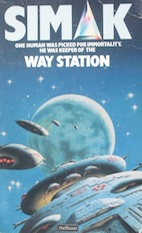 |
There are number of books I keep coming back to, books that made an impression on me at some time in my life and to which I return every five or ten years or so. Way Station by Clifford Simak is one of them.
First published back in 1963 this novel is representative of a type of science fiction story that would struggle to find a publisher these days. It tells the story of a lonely man in the mid-west of the United States who returns to his family farm at the end of the American Civil War. Following the death of his parents he is recruited by an alien to become the custodian of Earth's way station which is hooked into a galaxy-wide teleportation network. The farmer, Enoch Wallace, is the only man on Earth who is aware of the station or of the existence of other intelligent life-forms in the galaxy.
A hundred years after he has taken on his caretaker role he is being watched by a clandestine Government agency which has picked up rumours of a man who doesn't age or die. The agency representatives steal the body of an alien who died while on a layover in Enoch's station and the secret that Enoch has kept for so long is threatened with exposure. Add to this the political intrigues amongst factions of the galactic federation who want to shut down the station, as well as the loss of an artefact that connects the various alien races to the "spirit" of the galaxy and you have a classic mixture of conflicts at numerous levels: the personal, the local, planet-wide and galaxy-wide.
The resolution of all those conflicts provides the basic thrust of the novel and in lesser hands would generally have involved a lot of action set-pieces. Simak doesn't follow that route and instead follows a more measured and quieter approach. The novel is much better for it.
Way Station won the Hugo Award for Best Novel in 1964 and has always been very highly regarded within the genre. I think I first read the book back in the late sixties or early seventies; it made an impression on me then that still lingers. It's quiet and unassuming, with an intriguing set-up and a steady narrative drive. Don't be fooled by the fact that a lot of the elements of this novel have become sf standards (think of the Stargate franchise on television), this harks back to a time when such ideas were new and fresh. In the hands of a writer like Simak they still seem to be just that.

Recent Comments